-
ORIGINAL ARTICLE06-14-2024
Sleep duration and quality of Brazilian nursing staff who work in shifts
Revista Brasileira de Enfermagem. 2024;77(2):e20230167
Abstract
ORIGINAL ARTICLESleep duration and quality of Brazilian nursing staff who work in shifts
Revista Brasileira de Enfermagem. 2024;77(2):e20230167
DOI 10.1590/0034-7167-2023-0167
Views1See moreABSTRACT
Objective:
to analyze sleep duration and sleep quality in nursing professionals who work in shifts.
Method:
this is a cross-sectional, analytical research, carried out between September 2017 and April 2018, at a public hospital in southern Brazil, with the nursing team. A socio-occupational and health symptoms questionnaire, the Epworth Sleepiness Scale, and the Pittsburgh Sleep Quality Index were used. Data are presented as descriptive and inferential statistics, bivariate analysis, and binary logistic regression.
Results:
participants were 308 nursing professionals with a predominance of long-term sleep, absence of drowsiness, and poor sleep quality. Short-term sleep (<6h) was associated with day shift and poor sleep quality. Sleep quality was associated with presence excessive daytime sleepiness and work day shift.
Conclusion:
work shift, insomnia and headache were the main factors related short-term sleep for nursing professionals. The results may justify the development of intervention research for workers’ health.
-
06-14-2024
Teoria de médio alcance do diagnóstico de enfermagem sobrepeso
Revista Brasileira de Enfermagem. 2024;77(2):e20230372
Abstract
Teoria de médio alcance do diagnóstico de enfermagem sobrepeso
Revista Brasileira de Enfermagem. 2024;77(2):e20230372
DOI 10.1590/0034-7167-2023-0372
Views0See moreRESUMEN
Objetivo:
Construir una teoría de rango medio para el diagnóstico de enfermería Sobrepeso en adolescentes y adultos jóvenes.
Métodos:
Estudio metodológico a la luz de los marcos teóricos de Roy y de Lopes, Silva y Herdman. Un total de 3.925 artículos fueron recuperados y evaluados utilizando el software State of the Art Through Systematic Review. La muestra final fue de 28 artículos.
Resultados:
Los resultados convergieron en 3 atributos esenciales, 13 antecedentes y 7 consecuencias. Se construyó una teoría de rango medio compuesta por un diagrama ilustrado, 11 proposiciones y 12 relaciones causales.
Consideraciones finales:
A partir de la creación de la teoría, fue posible comprender mejor el diagnóstico de enfermería Sobrepeso en el contexto de adolescentes y adultos jóvenes. La comprensión de los fenómenos de enfermería contribuye para el avance y fortalecimiento de la ciencia de enfermería.
-
ORIGINAL ARTICLE06-14-2024
Meanings attributed to health-related quality of life by caregivers of adolescents with diabetes
Revista Brasileira de Enfermagem. 2024;77(2):e20230314
Abstract
ORIGINAL ARTICLEMeanings attributed to health-related quality of life by caregivers of adolescents with diabetes
Revista Brasileira de Enfermagem. 2024;77(2):e20230314
DOI 10.1590/0034-7167-2023-0314
Views0See moreABSTRACT
Objective:
to interpret the meanings attributed to the health-related quality of life by caregivers of adolescents with type 1 diabetes mellitus.
Methods:
qualitative, descriptive-exploratory study of 14 caregivers of adolescents with diabetes developed at the reference outpatient clinic for endocrine diseases in a city in the state of Paraíba. Interviews were performed between May and September 2021. Inductive thematic analysis of the empirical material, and its interpretation in light of the concepts of health-related quality of life and family functioning were performed.
Results:
the meanings attributed by caregivers to the health-related quality of life of adolescents converged on the feeling of being healthy, healthy eating, satisfactory family income, family involvement in care and effective access to the care network.
Final Considerations:
knowledge of these meanings enables health professionals to develop strategies that meet the unique demands of caregivers experiencing this diagnosis.
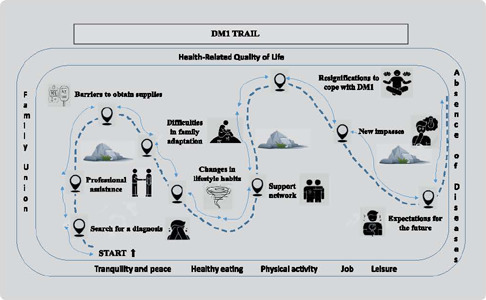
-
ORIGINAL ARTICLE06-14-2024
Cardiovascular Risk and Lifestyle: comparison between teaching workers in Portugal and Brazil
Revista Brasileira de Enfermagem. 2024;77(2):e20230354
Abstract
ORIGINAL ARTICLECardiovascular Risk and Lifestyle: comparison between teaching workers in Portugal and Brazil
Revista Brasileira de Enfermagem. 2024;77(2):e20230354
DOI 10.1590/0034-7167-2023-0354
Views0See moreABSTRACT
Objective:
Compare Cardiovascular Risk between workers in Brazil and Portugal who work in the teaching context and its relationship with Lifestyle and Common Mental Disorder.
Methods:
Cross-sectional study that compared the cardiovascular health conditions of teaching workers in Manaus (Brazil) and Coimbra (Portugal). The odds ratio between groups was estimated.
Results:
The differences were: Smoking and hypercholesterolemia in participants from Portugal. Hypertension, chronic disease, increased abdominal perimeter, common mental disorder, and absence from work in Brazil. The variables with the greatest effect for high cardiovascular risk were: Country-Portugal [17.273 (95%CI1.538-193.951)], sex-male [61.577 (95%CI5.398-702.469)] and smoking [593.398 (95%CI57.330-6.142.020)].
Conclusion:
The differences in risk between groups showed that participants from Portugal, men, with high blood pressure and/or smokers are the most vulnerable to having a cardiovascular event. There is a need for interventions to promote cardiovascular health in the workplace in both countries.
-
REVIEW06-14-2024
Primary health care professionals’ practice in the face of leprosy: a scoping review
Revista Brasileira de Enfermagem. 2024;77(2):e20230207
Abstract
REVIEWPrimary health care professionals’ practice in the face of leprosy: a scoping review
Revista Brasileira de Enfermagem. 2024;77(2):e20230207
DOI 10.1590/0034-7167-2023-0207
Views0See moreABSTRACT
Objectives:
to identify Primary Health Care professionals’ practice in the face of leprosy.
Methods:
a scoping review, carried out between November 2022 and January 2023, conducted according to the methodological structure proposed by JBI and checklist Preferred Reporting Items for Systematic Reviews and Meta-Analyses extension for Scoping Reviews in six databases and additional literature.
Results:
the sample consisted of 11 articles, published between 2008 and 2022. The findings were synthesized into three categories: Early diagnosis and timely treatment; Physical disability prevention; and Household and social contact surveillance.
Final Considerations:
there is a need to align the practices carried out with those recommended by the Brazilian National Program for Leprosy Control and Elimination, as some were not identified in studies, which implies losses to qualified assistance directed to patient demands, with a view to control and elimination of leprosy.
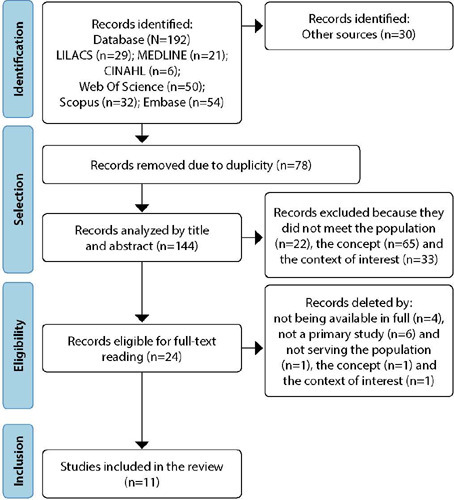
-
ORIGINAL ARTICLE06-14-2024
Strategies used by nurses regarding underreporting of rural work accidents due to pesticide use
Revista Brasileira de Enfermagem. 2024;77(2):e20230384
Abstract
ORIGINAL ARTICLEStrategies used by nurses regarding underreporting of rural work accidents due to pesticide use
Revista Brasileira de Enfermagem. 2024;77(2):e20230384
DOI 10.1590/0034-7167-2023-0384
Views0See moreABSTRACT
Objective:
To learn the strategies used regarding underreporting of pesticide use in rural areas.
Methods:
A qualitative study was carried out in eight primary healthcare units in rural areas and two emergency care units in a municipality in southern Brazil. Data collection took place in 2023 through interviews. Twenty professional nurses participated. The data was submitted to content analysis.
Results:
The strategies identified were lifelong and continuing education for the professionals who carry out the notification, active search and training of workers who deal directly with this type of substance, computerizing the notification by filling in the forms online, and carrying out research on the subject.
Final considerations:
Nurses play an important role in reporting occupational accidents caused by the use of pesticides, improving occupational safety in rural areas.

-
ORIGINAL ARTICLE06-14-2024
Validity of the TBApp mobile application for self-care management for people with tuberculosis
Revista Brasileira de Enfermagem. 2024;77(2):e20230195
Abstract
ORIGINAL ARTICLEValidity of the TBApp mobile application for self-care management for people with tuberculosis
Revista Brasileira de Enfermagem. 2024;77(2):e20230195
DOI 10.1590/0034-7167-2023-0195
Views1See moreABSTRACT
Objectives:
to describe the validity process of the TBApp mobile application for self-care management for people with tuberculosis linked to Primary Health Care.
Methods:
methodological research developed with ten expert judges, carried out virtually. The application was assessed in relation to content and technology quality in seven domains (objectivity; structure and appearance; relevance; functionality; reliability; usability; and efficiency), using an instrument with a Likert scale.
Results:
TBApp was considered valid, relevant, functional, reliable and effective by expert judges. The objectives, structure and presentation and relevance domains presented an overall Content Validity Index of 0.93, and the functionality, reliability, usability and efficiency domains presented characteristics and sub-characteristics values greater than 0.80.
Conclusions:
TBApp is a creative and innovative tool that can be used by people with TB and disseminated in the scientific community.
-
REVIEW06-14-2024
Critical analysis of the scientific production on Jean Watson’s Theory of Human Care
Revista Brasileira de Enfermagem. 2024;77(2):e20230231
Abstract
REVIEWCritical analysis of the scientific production on Jean Watson’s Theory of Human Care
Revista Brasileira de Enfermagem. 2024;77(2):e20230231
DOI 10.1590/0034-7167-2023-0231
Views0See moreABSTRACT
Objectives:
to analyze current scientific production on the use of the theoretical-methodological precepts of Jean Watson’s Theory of Human Care/Clinical Caritas Process.
Methods:
quantitative, exploratory, descriptive study using data from 1979 to 2023 in the Scopus database. Analysis was carried out using VOSviewer software.
Results:
the 73 studies included establish a network of collaboration among 221 authors from 155 institutions in 18 countries, who discuss the development of ethical behavior in nursing staff, through technical improvement, implementation, and validation of instrumental strategies capable of measuring and evaluating the quality of holistic and empathetic care. The Theory of Human Caring contributes to nursing training and care, and Process Clinical Caritas-Veritas is useful for the different possibilities of practice and education.
Conclusions:
it is important to strengthen with more empirical data a nursing work model centered on individual human care, supporting the evolution of scientific nursing knowledge.
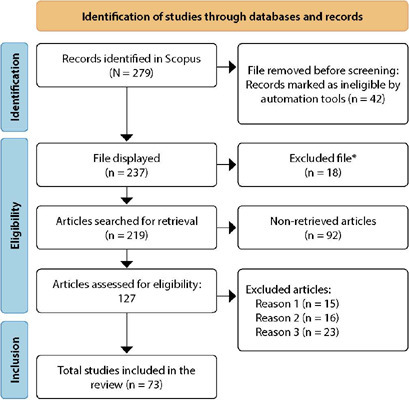
-
ORIGINAL ARTICLE12-16-2024
Narratives of sex workers: intimate partner violence and coping strategies
Revista Brasileira de Enfermagem. 2024;77(6):e20240180
Abstract
ORIGINAL ARTICLENarratives of sex workers: intimate partner violence and coping strategies
Revista Brasileira de Enfermagem. 2024;77(6):e20240180
DOI 10.1590/0034-7167-2024-0180
Views0See moreABSTRACT
Objectives:
to understand the narratives of sex workers about violence suffered by intimate partners and their coping strategies.
Methods:
qualitative research, focused on thematic oral history, carried out with six sex workers in southern Brazil, who responded to in-depth interviews using a flexible script. Thematic content analysis was used.
Results:
the study included cisgender women who self-identified as half black and half white. Most had children and were separated. They reported abusive relationships by their intimate partners, with emphasis on verbal, psychological, financial, and physical violence and attempted femicide. Such violence resulted in coping strategies, such as avoiding emotional bonds and maintaining a discreet life.
Final Considerations:
intimate partner violence is prevalent among participants, leading them to adopt strategies to preserve their safety and well-being, highlighting the need for public policies that meet their particularities and guarantee protection.
-
ORIGINAL ARTICLE12-16-2024
Software for the care of people with cardiovascular risk: construction and evidence of validity
Revista Brasileira de Enfermagem. 2024;77(6):e20240276
Abstract
ORIGINAL ARTICLESoftware for the care of people with cardiovascular risk: construction and evidence of validity
Revista Brasileira de Enfermagem. 2024;77(6):e20240276
DOI 10.1590/0034-7167-2024-0276
Views0See moreABSTRACT
Objectives:
to build and validate software for the care of people with cardiovascular risk.
Methods:
a methodological study, applied to software development, anchored in a nursing theory and classification system, in three stages: 1) requirements engineering; 2) software architecture and coding; and 3) testing and content validity by 12 experts in computer science, with a Content Validity Ratio score.
Results:
called e-TEORISC, in software format, for nursing care for people with cardiovascular risk, online and offline, containing a database linked to the Nursing Process stages. Experts considered that the attributes of functional suitability, performance efficiency, reliability, maintainability, usability, safety and portability obtained desirable scores.
Conclusions:
e-TEORISC has evidence of validity to instrumentalize care for people at cardiovascular risk, with potential for technology transfer to the Brazilian Health System.

-
ORIGINAL ARTICLE08-30-2024
Meanings attributed to changes experienced by individuals after COVID-19 hospitalization
Revista Brasileira de Enfermagem. 2024;77:e20230122
Abstract
ORIGINAL ARTICLEMeanings attributed to changes experienced by individuals after COVID-19 hospitalization
Revista Brasileira de Enfermagem. 2024;77:e20230122
DOI 10.1590/0034-7167-2023-0122
Views0See moreABSTRACT
Objectives:
to understand the meanings attributed to the experiences of individuals after hospitalization for COVID-19.
Methods:
qualitative study, with a theoretical framework based on Symbolic Interactionism and a methodological approach grounded in Grounded Theory. Nineteen participants who had moderate and severe forms of COVID-19 after hospitalization were interviewed. Data collection took place between April and November 2021 through online interviews, and the data were analyzed using initial and focused coding in the MAXQDA software.
Results:
the data illustrate new meanings attributed to different aspects of life after hospitalization, including relationships with others, the environment, physical and mental health, finances, identity, and interactions with a new social reality.
Conclusions:
the meanings are intrinsically linked to the value of interpersonal relationships, the perception of their impact, and the consequences after hospitalization. This allows professionals to understand the importance of this information to improve care and prepare for future epidemics.

-
ORIGINAL ARTICLE08-30-2024
Patient safety culture in times of the COVID-19 pandemic: a cross-sectional study in a hospital
Revista Brasileira de Enfermagem. 2024;77:e20230187
Abstract
ORIGINAL ARTICLEPatient safety culture in times of the COVID-19 pandemic: a cross-sectional study in a hospital
Revista Brasileira de Enfermagem. 2024;77:e20230187
DOI 10.1590/0034-7167-2023-0187
Views0See moreABSTRACT
Objectives:
to assess patient safety culture during the COVID-19 pandemic and identify the dimensions that need to be improved in hospital settings and which sector, open or closed, direct or indirect care, exhibits a higher level of safety culture.
Methods:
a descriptive and cross-sectional study. The validated version for Brazil of the Hospital Survey on Patient Safety Culture instrument was applied to assess patient safety culture. Those dimensions with 75% positive responses were considered strengthened.
Results:
all dimensions presented results lower than 75% of positive responses. Closed sectors showed a stronger safety culture compared to open ones. Indirect care sectors had a low general perception of patient safety when compared to direct care sectors.
Conclusions:
with the pandemic, points of weakness became even more evident, requiring attention and incisive interventions from the institution’s leaders.

-
REVIEW08-30-2024
Educational actions conducted during the pandemic with primary health care professionals: a scoping review
Revista Brasileira de Enfermagem. 2024;77:e20230352
Abstract
REVIEWEducational actions conducted during the pandemic with primary health care professionals: a scoping review
Revista Brasileira de Enfermagem. 2024;77:e20230352
DOI 10.1590/0034-7167-2023-0352
Views0See moreABSTRACT
Objectives:
to map the educational actions conducted with primary health care professionals during the COVID-19 pandemic.
Methods:
a scoping review conducted in August 2023, which covered databases such as CINAHL, Medline, LILACS, IBECS, BDENF, and Web of Science. In total, 32 publications were analyzed through content analysis.
Results:
the primary beneficiaries of the educational actions included 69% physicians, 56% nurses, 25% pharmacists, 13% social workers and dentists, 9% psychologists, community health agents, and laboratory professionals, and 6% nursing technicians, nutritionists, and physical educators. The predominant educational interventions were training sessions (mentioned in 19 publications), followed by Continuing Health Education (10 publications) and Continuing Education (three publications).
Final Considerations:
the educational interventions demonstrated positive impacts on professional practice, particularly the Continuing Health Education actions, which were notable for stimulating critical problem-solving among professionals.

-
REVIEW08-30-2024
Impact of financial toxicity on adults with cancer during the COVID-19 pandemic: an integrative review
Revista Brasileira de Enfermagem. 2024;77:e20240078
Abstract
REVIEWImpact of financial toxicity on adults with cancer during the COVID-19 pandemic: an integrative review
Revista Brasileira de Enfermagem. 2024;77:e20240078
DOI 10.1590/0034-7167-2024-0078
Views0See moreABSTRACT
Objectives:
to identify the repercussions of financial toxicity on the lives of adult cancer patients during the COVID-19 pandemic.
Methods:
an integrative review was conducted using the PubMed, Web of Science, Scopus, and Embase databases, as well as the Virtual Health Library portal, in March 2023.
Results:
out of 62 studies found, 13 were included for analysis. The primary repercussions of financial toxicity included difficulties in covering basic expenses such as food, housing, medication, transportation, and internet access; increased anxiety and concerns related to health and financial situations; reduction or absence of income; challenges in obtaining treatment or accessing healthcare services; rising expenses; and telemedicine as a less burdensome alternative.
Conclusions:
the pandemic has exacerbated financial toxicity; therefore, healthcare teams must recognize it as an adverse event of oncological treatment and understand its potential to affect various aspects of patients’ lives.

-
03-08-2024
Nursing as a player in tackling vaccine hesitancy and refusal
Revista Brasileira de Enfermagem. 2024;77:e77suppl101
Abstract
Nursing as a player in tackling vaccine hesitancy and refusal
Revista Brasileira de Enfermagem. 2024;77:e77suppl101
DOI 10.1590/0034-7167.202477suppl101
Views1Since the 1970s, the Brazilian Ministry of Health established the Brazilian National Immunization Program (PNI – Programa Nacional de Imunização), which preceded the Brazilian Health System and which was incorporated and strengthened due to the decentralized model to municipalities, but under single command at central level. Its objective was and still is to coordinate vaccination […]See more -
12-16-2024
Religión y experiencia profesional: ¿Serán predictores de la inteligencia espiritual de los enfermeros? Estudio transversal
Revista Brasileira de Enfermagem. 2024;77(6):e20240217
Abstract
Religión y experiencia profesional: ¿Serán predictores de la inteligencia espiritual de los enfermeros? Estudio transversal
Revista Brasileira de Enfermagem. 2024;77(6):e20240217
DOI 10.1590/0034-7167-2024-0217es
Views1See moreRESUMEN
Objetivos:
analizar la relación entre religión y experiencia profesional con la inteligencia espiritual en enfermeros.
Métodos:
estudio transversal y analítico realizado en 2021, participaron 544 profesionales de enfermería que laboraban en establecimiento de salud de Perú durante la pandemia por COVID-19. Para el análisis de los datos se emplearon el análisis de regresión múltiple y correlación de Pearson.
Resultados:
en los enfermeros predominó un nivel de inteligencia espiritual saludable (42,8%). Quienes no profesaban una religión tenían mayor probabilidad de tener menor puntaje de inteligencia espiritual (escala global y dimensiones); sin embargo, los enfermeros expertos tuvieron mayor probabilidad de tener mayor inteligencia espiritual (escala global y dimensiones) que los enfermeros novatos (p<0,05).
Conclusiones:
la inteligencia espiritual en los enfermeros fue predicha por la religión y la experiencia profesional. Este hallazgo sugiere que la inteligencia espiritual en enfermería se consolida mediante prácticas religiosas y durante el ejercicio profesional.
-
ORIGINAL ARTICLE05-24-2021
Construction and validation of educational material on promoting breastfeeding in schools
Revista Brasileira de Enfermagem. 2021;74:e20200511
Abstract
ORIGINAL ARTICLEConstruction and validation of educational material on promoting breastfeeding in schools
Revista Brasileira de Enfermagem. 2021;74:e20200511
DOI 10.1590/0034-7167-2020-0511
Views1See moreABSTRACT
Objective:
to build and validate an educational technology on the promotion of breastfeeding for schoolchildren.
Methods:
a methodological study was developed through a bibliographic survey, situational diagnosis, creation of illustrations, layout, design and texts, validation of the material with the help of expert judges and target audience.
Results:
the content judges enabled the validation of the material with an overall Content Validity Index of 90%, the judges of the design Suitability Assessment of Materials of 90.4% and the target audience with a 95.6% agreement. The readability percentage proved to be excellent, with an overall score of 100%.
Conclusion:
the educational technology proved to be a valid and reliable instrument to promote a breastfeeding culture among schoolchildren.

-
ORIGINAL ARTICLE06-08-2020
Nurses’ responsibilities in the aerospace environment
Revista Brasileira de Enfermagem. 2020;73(4):e20180777
Abstract
ORIGINAL ARTICLENurses’ responsibilities in the aerospace environment
Revista Brasileira de Enfermagem. 2020;73(4):e20180777
DOI 10.1590/0034-7167-2018-0777
Views0See moreABSTRACT
Objectives:
to characterize the nurses who work in the aerospace environment and to identify their most frequent responsibilities during the pre-flight, flight, and post-flight periods.
Methods:
a quantitative, exploratory-descriptive research, conducted using a survey through Google forms®, from January to April of 2018, with 50 nurses from aerospace services in Brazil. Data were analyzed using descriptive statistics.
Results:
predominance of male participants (64%), mean age of 37 years, with a mean working time in the aerospace environment of six years, in helicopter (54%), and in the southern region (42%). The main pre-flight, flight, and post-flight activities were, respectively: verification/testing of equipment functionality, nursing care for patients, and replacement of supplies and equipment.
Conclusions:
In the aerospace environment, nurses’ work are primarily organizational and victim care actions, during all phases of the flight.
-
04-14-2021
Specialized nursing terminology for the care of people with COVID-19
Revista Brasileira de Enfermagem. 2021;74:e20200741
Abstract
Specialized nursing terminology for the care of people with COVID-19
Revista Brasileira de Enfermagem. 2021;74:e20200741
DOI 10.1590/0034-7167-2020-0741
Views0See moreABSTRACT
Objective:
To create specialized nursing terminology for the care of people with COVID-19.
Methods:
Methodological study, carried out based on the identification of concepts related to the care of the person with the infection, present in the official guidelines of the Brazilian Ministry of Health; the concepts were validated by three specialist nurses; and a cross-mapping of the extracted concepts was done with CIPE® 2019 primitive concepts.
Results:
Out of 436 unique concepts, being 399 of these validated; of these, 70.9% were in the Classification and referred to the nursing care of people with COVID-19. In the Axis, the concepts related to Focus, Action, and Environment stood out. As for the non-validated concepts, 78.4% were not included in the 2019 version of CIPE®.
Conclusion:
We were able to structure a specialized CIPE® terminology, with the potential to generate nursing care indicators for people with COVID-19.
-
ORIGINAL ARTICLE05-18-2020
Validation of the definitions of nursing diagnoses for individuals with Aids
Revista Brasileira de Enfermagem. 2020;73(4):e20180915
Abstract
ORIGINAL ARTICLEValidation of the definitions of nursing diagnoses for individuals with Aids
Revista Brasileira de Enfermagem. 2020;73(4):e20180915
DOI 10.1590/0034-7167-2018-0915
Views0See moreABSTRACT
Objectives:
to develop and validate conceptual and operational definitions of nursing diagnoses of the International Classification for Nursing Practice for people living with Aids.
Methods:
methodological study with 100 individuals with Aids, in a hospital school. In addition, 19 nurses selected from the Lattes platform acted as experts in the validation process. The research was conducted, using three moments: identification and validation of the nursing diagnoses; construction of the conceptual and operational definitions of the diagnoses, and content validation, using the content validity index.
Results:
a total of 35 diagnoses were identified and 18 had their conceptual and operational definitions validated, with validity index of ≥ 0.8.
Conclusions:
the construction of the conceptual and operational definitions enables nurses to analyze the clinical inferences and endorse the nursing diagnosis, contributing to its predictive capacity.
-
06-28-2021
Baby-Friendly Hospital Initiative for Neonatal Wards: impact on breastfeeding practices among preterm infants
Revista Brasileira de Enfermagem. 2021;74:e20200909
Abstract
Baby-Friendly Hospital Initiative for Neonatal Wards: impact on breastfeeding practices among preterm infants
Revista Brasileira de Enfermagem. 2021;74:e20200909
DOI 10.1590/0034-7167-2020-0909
Views0See moreABSTRACT
Objective:
to assess breastfeeding support practices for preterm infants at two Baby-Friendly hospitals in southeastern Brazil, comparing the effect of implementing the guidelines for Baby-Friendly Hospital Initiative for Neonatal wards.
Methods:
a quasi-experimental study, pre- and post-intervention with control. Implementation of this initiative in the intervention hospital using Knowledge Translation. Data collection on compliance with the adapted Ten Steps, Three Guiding Principles and the Code before and after the intervention was carried out via interviews with mothers of preterm babies and professionals, unit observation and documentary analysis in the intervention and control hospitals. Intra-intergroup comparison was performed.
Results:
increases in global compliance with the Three Principles, Ten Steps, the Code, partial compliance with each Principle and in most Steps was greater in the intervention hospital. Conclusion: this initiative improved practices related to breastfeeding in the intervention hospital, demonstrating the potential to improve care and breastfeeding in neonatal wards.

-
08-16-2021
The prevalence of the technocratic model in obstetric care from the perspective of health professionals
Revista Brasileira de Enfermagem. 2021;74:e20200689
Abstract
The prevalence of the technocratic model in obstetric care from the perspective of health professionals
Revista Brasileira de Enfermagem. 2021;74:e20200689
DOI 10.1590/0034-7167-2020-0689
Views0See moreABSTRACT
Objectives:
to identify the reasons for the prevalence of the technocratic model in obstetric care from the perspective of health professionals.
Methods:
Grounded Theory. Study approved by two Research Ethics Committees and conducted by theoretical sampling, from July 2015 to June 2017. Twenty-nine interviews were conducted with health professionals from two maternity hospitals in the Southern Region of Brazil. Data collection and analysis was performed alternately; and analysis by open, axial, and selective coding/integration.
Results:
the technocratic model still persists because the assistance is performed in a mechanized way, centered on the professionals. There is a lack of systematization of care, and under-dimensioning of the nursing staff.
Final Considerations:
obstetric nurses need to review their performance in obstetric centers, the internal organization, the dimensioning of nursing professionals, and become protagonists of care. Investment in academic training/updating the knowledge of midwifery professionals, based on scientific evidence and user-centered care is necessary.
-
REVIEW09-18-2020
Cloth masks as respiratory protections in the COVID-19 pandemic period: evidence gaps
Revista Brasileira de Enfermagem. 2020;73:e20200239
Abstract
REVIEWCloth masks as respiratory protections in the COVID-19 pandemic period: evidence gaps
Revista Brasileira de Enfermagem. 2020;73:e20200239
DOI 10.1590/0034-7167-2020-0239
Views0See moreABSTRACT
Objective:
to identify scientific evidence on the effectiveness of using cloth masks as safe protectors against COVID-19.
Method:
an integrative review of articles available in full obtained at PubMed, CINAHL, and Web of Science. Controlled, non-controlled descriptors and keywords such as “mask”, “home-made” and “cloth” or “cotton” and “infection control” or “infection prevention” were used.
Results:
thirty-eight articles were selected; of these, seven studies made up the sample. Evidence shows that cloth masks do not have the same protective characteristics as surgical masks, indicating an increased risk of infection due to humidity, diffusion of fluids, virus retention, and improper preparation. Considering the shortage of surgical masks during the pandemic, cloth masks could be proposed as a last resort.
Conclusion:
cloth masks should be used together with preventive measures, such as home insulation, good respiratory conduct, and regular hand hygiene.
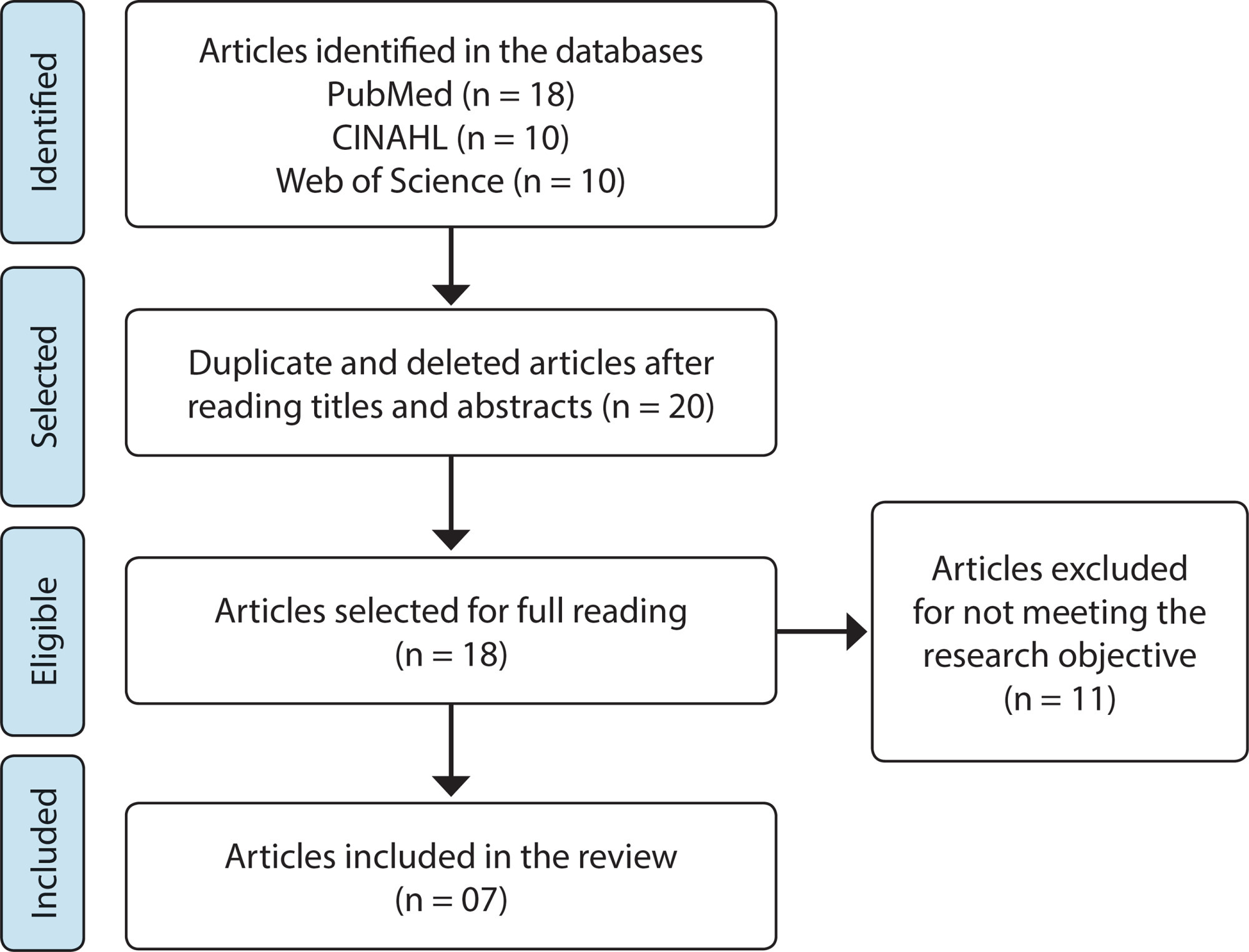
-
ORIGINAL ARTICLE06-01-2020
Primary care quality and its effects on leprosy monitoring indicators
Revista Brasileira de Enfermagem. 2020;73(4):e20190038
Abstract
ORIGINAL ARTICLEPrimary care quality and its effects on leprosy monitoring indicators
Revista Brasileira de Enfermagem. 2020;73(4):e20190038
DOI 10.1590/0034-7167-2019-0038
Views0See moreABSTRACT
Objectives:
to evaluate the quality of primary care in leprosy control actions, to correlate effects on monitoring indicators.
Methods:
a cross-sectional study, conducted in Belo Horizonte, from July to September 2014. Interviews with 408 professionals were conducted through the application of a tool that assesses attributes of primary care in leprosy control actions, and monitoring indicators were calculated. Spearman correlation was used, significance level p < 0.05.
Results:
the overall score correlated with the percentage of cases treated in primary care and of family health staff coverage. The derived score correlated with the percentage of cases treated in primary care, and the essential score correlated with the proportion and rate of cases diagnosed, with grade 2 physical disability.
Conclusions:
the quality of leprosy control actions performed by primary care professionals produces impacts on health indicators, and developing strategies consistent with the reality of the territory is necessary.
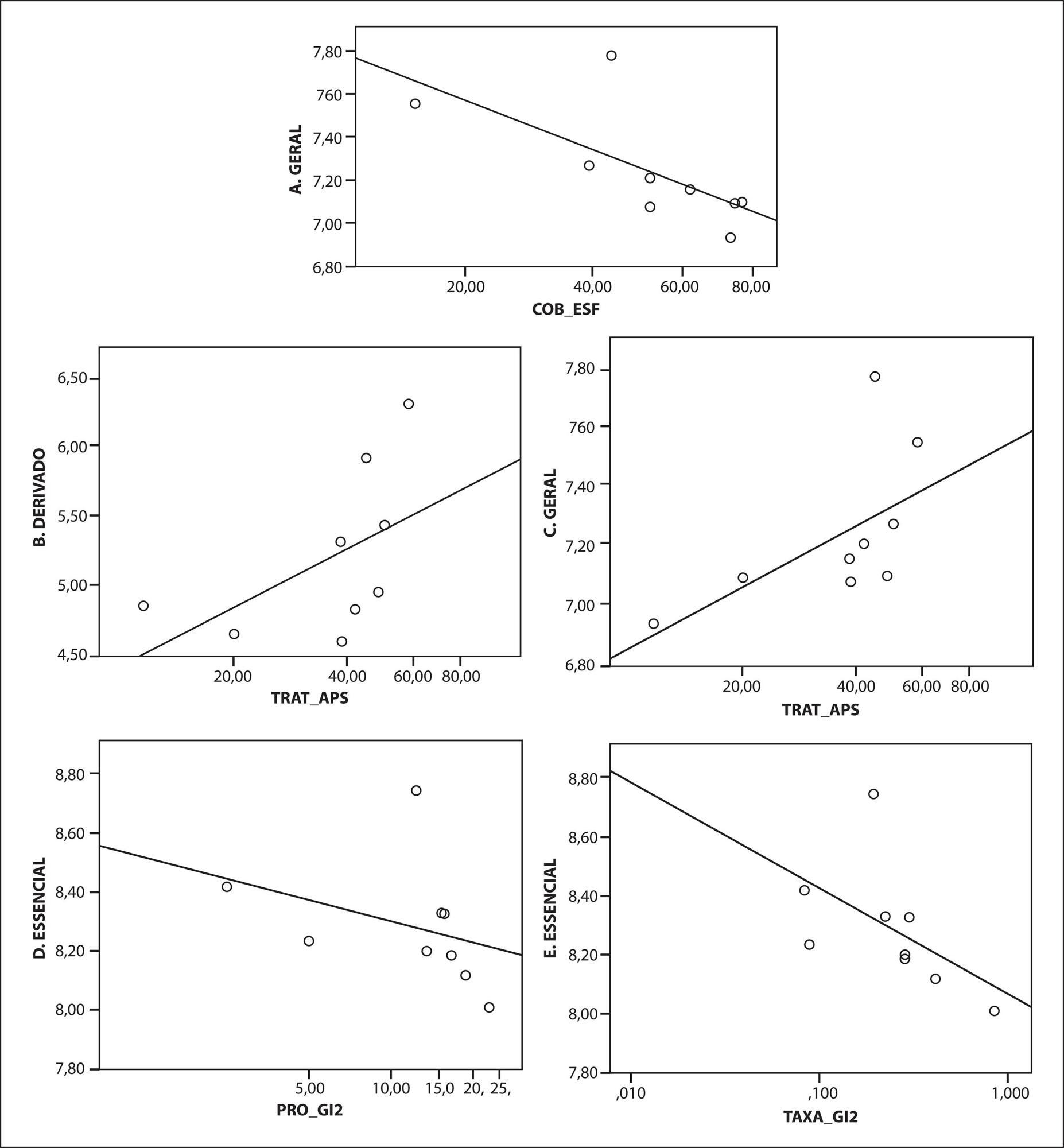
Search
Search in:
Nuvem de Tags
Adolescente (85) Atenção Primária à Saúde (239) COVID-19 (91) Criança (91) Cuidados de Enfermagem (269) Educação em Enfermagem (151) Educação em Saúde (139) Enfermagem (930) Enfermagem Pediátrica (86) Estudantes de Enfermagem (77) Estudos de Validação (131) Família (87) Idoso (208) Promoção da Saúde (99) Qualidade de Vida (104) Saúde do Trabalhador (86) Saúde Mental (145) Saúde Pública (82) Segurança do Paciente (150) Tecnologia Educacional (100)



